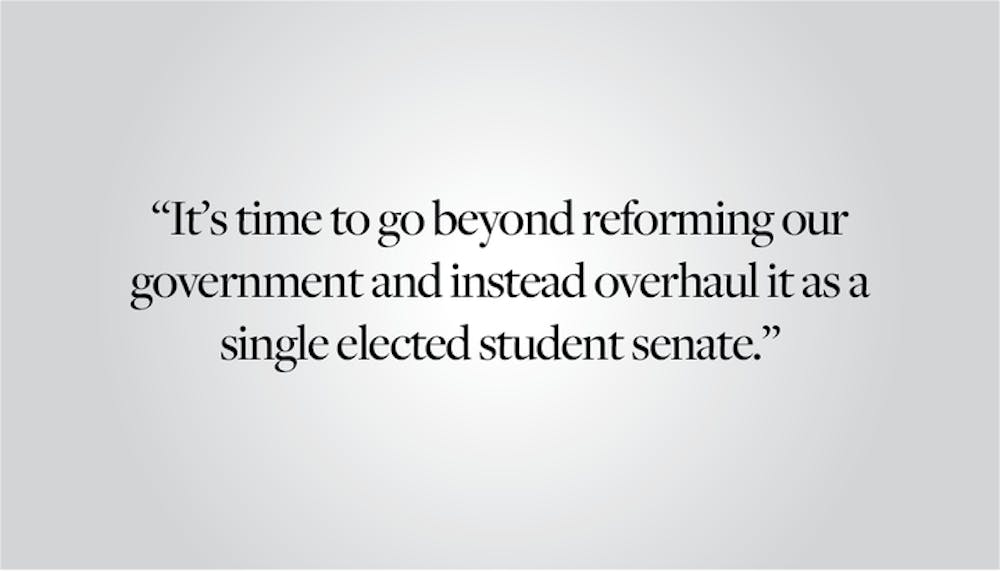Next week, the University’s undergraduate student body will vote for leaders of the Undergraduate Council of Students, the Undergraduate Finance Board and the Class Coordinating Board — the three branches of Brown’s Student Government Association. But after a particularly tumultuous and controversial year for the University’s student government, students should reflect on the structural shortcomings of its ineffective, unengaging and arcane student government. It’s time to go beyond reforming our government and instead overhaul it as a single elected student senate.
Complaints about student government at Brown are not new, but they have become especially pronounced amid this year’s controversies. Kicked off by an insufficient effort to unify the three branches of the University's student government, last spring’s dramatic runoff election for UCS president was brought about by confusion over whether the election should have been held under SGA’s new rules or UCS’s pre-existing bylaws. Then, at the start of the fall semester, UCS leadership dismissed its general body, triggering an unsuccessful recall saga. Of course, this year has not been all bad: UCS has been more productive than in past years and CCB seems to put on events with general success. But recent minor wins simply do not make up for the simple fact that, last semester, less than a fourth of Brown students believed they had actually benefited from a UCS program.
This is not a situation that the current government can easily fix. Past reform efforts — which have added unnecessary bylaws to this already tangled mess of rules — are proof that recent leaders think the solution to dysfunction is further tedious complexity. But we don’t need such symbolic referenda to fix the situation, nor a 55-position student government with confusing roles like the hard-to-distinguish UCS chair of campus life and UFB student activities chair. Instead, we need an engaging student government that is the right scale and complexity for an undergraduate population of 7,000.
A first step could be to replace our current byzantine system with a simple student senate. Like our peers at Dartmouth and Georgetown University, Brown undergrads ought to have the opportunity to elect a general body to be their voice in government. For example, each grade could elect 10 members, picking based on who they believe would make good representatives without needing to understand the ins and outs of each currently elected position. Once the 40-member senate convenes, it could divvy up specific responsibilities currently held by the three branches among its members — after all, those most interested in student government will know best who among them would make good finance or outreach directors. Committees would be formed of members to handle important duties such as appointments and inclusion, and their chairs would fill the vacuums where we currently have elected leaders. While it is possible that a senate would struggle to fill out more obscure committees, our current system is no better: This spring, for example, no one is running to be the 2025 Class Coordinating Board president, secretary, treasurer or community outreach officer.
It would still be smart to have one separate elected position. An elected president would be an important advocate for students with University administration and set the tone for student government. On a practical level, a president could lead senate meetings and break ties on evenly divided votes.
This would be a more accessible government. Today, you have to parse through a jumble of titles to figure out who the right member of our student government to ask about any given problem is. If each grade had 10 representatives in a unified body, it would greatly simplify the process. This structure would also make our government more representative, allowing each grade an equal stake in governmental decision making.
Good government is legible, and today’s completely indecipherable system is keeping students away. Turnout in school elections is abysmal and no one is exactly sure what the student government does or how it works. By putting all the responsibilities in one place and giving undergrads a single body to keep up with, a student senate and president would encourage more active participation and higher engagement.
Editorials are written by The Herald’s editorial page board and aim to contribute informed opinions to campus debates while remaining mindful of the group’s past stances. The editorial page board and its views are separate from The Herald’s newsroom and the 133rd Editorial Board, which leads the paper. This editorial was written by the editorial page board’s editor Kate Waisel ’24 and members Irene Chou ’23, Yasmeen Gaber ’23, Tom Li ’26, Jackson McGough ’23, Alissa Simon ’25 and Yael Wellisch ’26.





